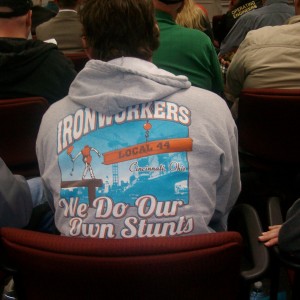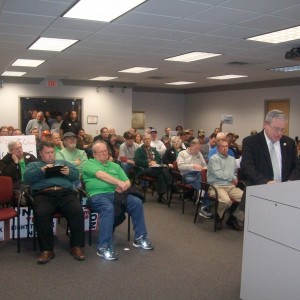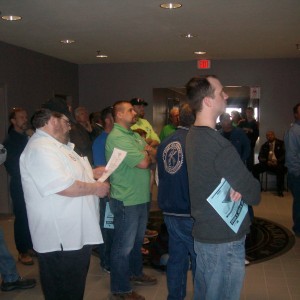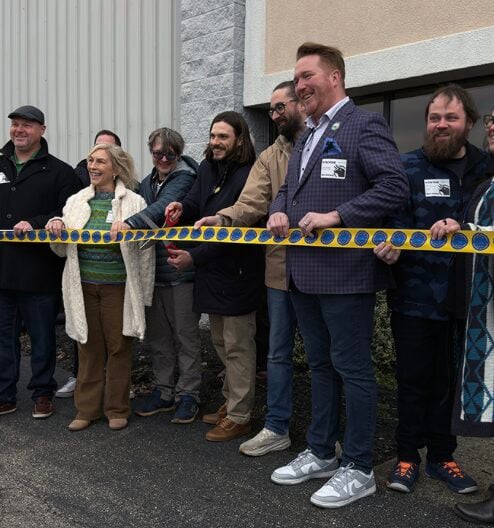By Mark Hansel
NKyTribune Contributor
The Boone County Fiscal Court unanimously approved a right-to-work ordinance Tuesday, making it the first in Northern Kentucky to pass the controversial measure.
An overflow crowd of more than 150 people, mostly labor union members opposed to the ordinance, were unable to sway the elected officials.
Commissioner Charlie Walton said the Fiscal Court had the responsibility to do what was in the best interests of the county.

“There is evidence on both sides,” Walton said. “I don’t want you to think we aren’t looking at the information, but we are wanting to make the decision that’s going to be best for Boone County, Kentucky.”
Boone County began to consider passing a local right-to-work ordinance after attempts to approve a statewide measure died in a House committee during the current Legislative session.
Right-to-work allows people who don’t pay union dues or fees to work in a union environment. It also requires unions to represent those workers in the same manner as union workers in order to maintain their right to enter into collective bargaining with businesses.
Supporters of the measure contend it is an economic development tool that is needed to make Kentucky competitive with other states, including Tennessee and Indiana, which already have right to work. Opponents say it is designed to weaken unions and forces them to represent non-union workers without compensation.
Those in attendance included Kroger employees, members of United Food and Commercial Workers Union #75, and Turfway Park workers who belong to Racetrack Employees Union #541, as well as several trade union representatives.
Bonnie Frank, who lives in Grant County but works at the Kroger in Walton, implored the Fiscal Court to vote the measure down.
“I believe in Northern Kentucky, but Northern Kentucky doesn’t believe in me,” Frank said.

Dan Tobergte, president and CEO of Northern Kentucky Tri-ED and Trey Grayson, president of the Northern Kentucky Chamber of Commerce, were among those who spoke in support of right-to-work.
“It’s a tool that we need in our economic toolbox to continue the great growth we’ve had in Boone County,” Grayson said. “When you look at the states around America that are becoming right-to-work, it’s becoming harder for us to compete and continue this economic growth.”
There are now 25 right-to-work states and two others, New Mexico and West Virginia, which also borders Kentucky, are considering legislation.
Judge-executive Gary Moore limited comments to three minutes per speaker during public comment, but allowed some to exceed that time and the discussion lasted more than an hour. Many in attendance raised signs throughout the night and there were a few spontaneous outbursts, but the crowd was mostly restrained.
Moore praised those in attendance for respecting the process.
“I want to complement both sides for your respect and courtesy to each other,” Moore said. “I’ll be honest, (the discussion) was much better than I thought it might be. I know it’s a very passionate issue for you…and it’s something that you believe in to the depths of your heart.”
Passion, however, did not equal persuasion. Ultimately, the all-Republican Fiscal Court voted the way most expected it would.
Tim Donoghue, Northern Kentucky AFL-CIO Labor Council president, said he was disappointed with the decision, but not surprised.
“I feel like it was a done deal before we ever got here,” Donoghue. “I thank everybody who did show up and poured their hearts out, but it didn’t work out for us tonight.”
 The ordinance will go into effect immediately, but there is a chance it could be short lived.
The ordinance will go into effect immediately, but there is a chance it could be short lived.
A lawsuit has been filed by labor unions in Federal Court against Hardin County in an effort to prevent the right-to-work law from going into effect there.
Counties that have passed right to work say Home Rule legislation, approved by the Kentucky General Assembly in 1978, allows for right-to-work legislation at the local level.
Opponents say local governments are preempted by the National Labor Relations Act from enacting right-to-work ordinances.
A decision on the lawsuit is expected this summer, but, with appeals likely regardless of that outcome, the issue could take much longer to resolve.

















